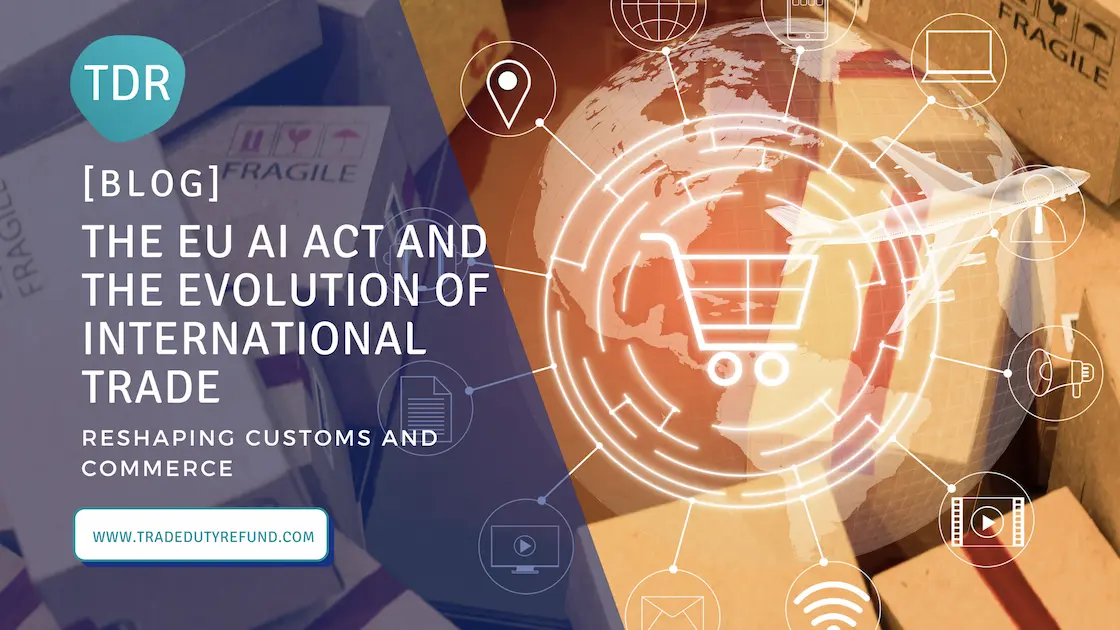The EU AI Act and the Evolution of International Trade: Reshaping Customs and Commerce

Artificial Intelligence (AI) has certainly taken the world by storm. In recent years, we have seen the benefits that AI technology can bring to business and society in terms of innovation, efficiency and creativity, however many have also experienced the dark side of AI from bias to security breaches. As businesses navigate the complexities of global commerce, AI emerges as a powerful tool, revolutionizing customs operations, supply chains, and fostering greater efficiency in cross-border trade.
Meanwhile, the European Union has been negotiating the terms of EU AI Act, the first of its kind to tackle regulation when it comes to this disruptive technology. Last Friday, the 27-EU member bloc finally agreed on a rulebook that will govern the way AI technology is used, trying to find the right balance between protecting EU citizens and fostering innovation in digital transformation.

The EU AI Act will restrict some applications of AI technology, impose strict limits on use cases considered high-risk, and bombard the most advanced software models with obligations of transparency and stress-testing.
While AI has made its way into all aspects of our daily lives, from healthcare to education to shopping, where will it leave its impact on international trade and logistics? Trade Duty Refund looks at some key factors and how companies can factor AI into their strategy.
Streamlining Customs Procedures
Traditionally, customs clearance has been a labor-intensive and time-consuming process, often prone to errors and delays. However, AI-powered solutions are revolutionizing customs operations by automating and optimizing procedures. Machine learning algorithms analyze vast amounts of data to predict and classify goods more accurately, reducing manual intervention and expediting clearance processes. This enhanced efficiency not only saves time and resources but also enhances trade facilitation and competitiveness on a global scale.
Improving Trade Documentation and Compliance
AI-powered platforms are revolutionizing trade documentation processes, simplifying paperwork and ensuring compliance with regulatory requirements. Natural language processing (NLP) algorithms extract key information from trade documents, such as invoices and certificates of origin, reducing manual data entry errors and streamlining document verification procedures. By digitizing and automating documentation processes, AI accelerates trade transactions and minimizes bureaucratic hurdles for businesses engaged in international trade
Optimizing Supply Chain Management and Reverse Logistics
Supply chain optimization is critical for businesses seeking to remain competitive in the global marketplace, and now with over 20% of eCommerce retail orders being returns, a whole process has been dedicated to “reverse logistics”. AI-driven supply chain management solutions offer real-time visibility and predictive insights into supply chain operations, enabling businesses to anticipate demand fluctuations, optimize inventory levels, and mitigate supply chain risks more effectively.
While AI presents numerous benefits for international trade and customs operations, challenges remain, particularly regarding data privacy, cybersecurity, workforce displacement and scalability and accuracy as the global trade market continues to grow rapidly.
AI-powered technology for Customs Duty Refunds
Trade Duty Refund focuses exclusively on customs duty returns for international merchants doing business in the UK or EU. While we are rigorously following updates regarding the EU AI Act and its impact on international trade and commerce, we can confidently say that AI is significantly impacting customs duty refunds by revolutionizing the process, making it more efficient, accurate and transparent.
Trade Duty Refund uses AI-powered technology to help companies get refunds quickly, filing bulk claims with authorities, and accurately. Our technology-driven process helps:
-Automate eligibility determination analyzing vast amounts of data provided by companies -Speed up the processing time by automating verification checks -Enhance accuracy and compliance in refund calculations, cross-referencing data and conducting risk assessments -Facilitate data exchange between authorities, businesses and brokers
In conclusion, even if AI technology is set to be regulated more scrupulously, especially in the EU, it is still a very powerful tool in the trade and customs business. At Trade Duty Refund, we are embracing this technology in our customs duty returns process to calculate and claim the duties global retailers are owed when they do business in the UK and EU. Schedule a free discovery call with our experts to get a calculation estimate and a chat about customs compliance expectations in the UK and EU.